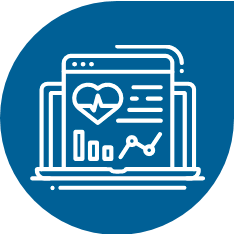Evidence and information are essential for managing human resources for health (HRH) effectively and supporting the implementation of evidence-based policies. Our goal is to work with the countries of the Americas to significantly increase access to and use of information and generate evidence about the health workforce.
- Building governance is crucial to overcoming many problems related to Human Resources for Health Information Systems (HRHIS) and HRH management and planning.
- HRHIS are under development in most of the countries of the Region. These are progressive, long-term processes that require sustained financing.
- HRHIS are generally delegated to systems technicians, with little strategic vision regarding data needs and few opportunities to use the information for management and planning.
- Most countries have made concerted efforts to improve HRHIS governance and the availability of information on HRH in order to address poor intersectoral collaboration on data collection from the education, labor, finance, and health sectors.
- Despite progress, difficulties persist regarding the availability of HRH information, particularly from the private sector.
- High turnover and personnel shortages among specialized HRH jeopardize the sustainability of the process.
- Countries have agreed on regional and global mandates, strategic frameworks, and regulatory and technical instruments to improve information on HRH and address critical health workforce issues.
Health systems depend on highly qualified professionals, who play a vital role in the identification, diagnosis, treatment, and prevention of diseases and in promoting healthy lifestyles. For health systems to plan effective and equitable health policies, they must know who these health professionals are, where they are located, how they are distributed, and their competencies and specializations. This knowledge is the basis for planning successful health policies and ensuring everyone has equal access to quality health services.
The Evidence and Information Team of the Human Resources for Health Unit (HSS/HR) leads technical cooperation aimed at strengthening HRHIS, generating evidence and information to support HRH management, health workforce planning, and commitments at the national, regional, and international levels. We help strengthen governance mechanisms for HRH information, data collection, and the development of tools to facilitate analysis and decision-making.
Technical cooperation in this area includes: 1) implementation of National Health Workforce Accounts (NHWA); 2) mapping of occupations and standardization of information in alignment with the International Standard Classification of Occupations (ISCO); 3) methodology for evaluating the maturity of HRHIS; 4) mapping of actors; and 5) dissemination of data on the HRH situation in the Region, in addition to several studies related to HRH.
Our priorities
- Promote and strengthen governance of HRH information systems in the countries of the Region.
- Support countries in the development of reliable HRHIS for health management and planning.
- Improve the availability, quality, and analysis of data for monitoring and evaluating the health workforce.
- Generate, synthesize, and disseminate evidence and strategic information for policy and decision-making on HRH.










